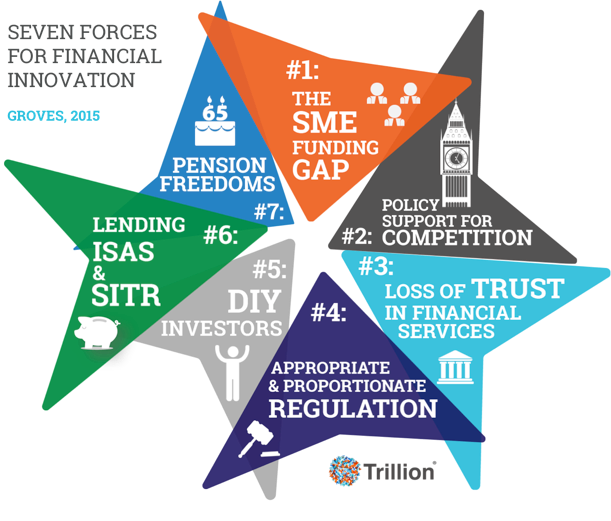We hear from Julia Groves, chief executive of Trillion Fund and chair of the UK Crowdfunding Association, on seven forces she believes are driving innovation in finance

One of the legacies of the financial crisis has been the evaporation of credit for small and medium-sized businesses. Forget a trickle down from QE – SMEs have been lapping at tiny droplets of cash reluctantly filtered down their way by the big banks.
This is the primary driver of technological innovation in alternative finance – a gap in the market, or rather a great, yawning chasm. And more finance for small businesses is something the Government actively supports, knowing this is an important way to wean the UK economy off monetary stimulus and genuinely boost GDP – so in filling this hole, innovators do have policy backing.
‘The Rise of Future Finance‘ research by Cambridge, Nesta and Berkeley estimated the size of consumer lending to businesses at £749m in 2014 and also highlighted that business borrowers valued the ease and speed of raising money through alternative finance providers above even the cost of that money.
Increasing competition in financial services (and in our Trillion™ niche, in the energy market too) is also a policy priority. Increased diversity is not just about effective competition, it is also about a more stable financial services market where no single player is too big to fail or too big to jail.
With innovation and competition on a policy pedestal, a favourable regulatory environment is vital.
The re-engineered regulator – the Financial Conduct Authority – is now more geared up to provide protection for investors without stifling the companies that are trying to change financial services for the better, forever. With regular industry reviews, consultations and guidance, the FCA has so far adopted a fairly helpful approach to regulating peer-to-peer lending and equity crowdfunding. Platforms that bemoan the impact of the FCA on growth should remember one thing: what the sector does not need is a big fat misselling scandal. And the presence of appropriate and proportionate regulation will help to prevent this happening and help the industry to grow in such a way that customers are not unwittingly put at risk, while still having access to new investment opportunities.
Meanwhile, on the demand side, there are the people who will put their money to work to earn a decent return.
Firstly, an underlying disillusionment with the traditional banking system underpins the growth of “alternative” finance. There is a real need for transparency to build trust, in particular for the increasingly grown up millennial who want to work for, buy from, and invest in companies with a purpose beyond making money.
The three classic drivers for change are (i) dissatisfaction with the status quo, (ii) a real alternative, and (iii) minimum friction in switching from one to the other. I would argue we have the first two in spades, and the policy makers are helping with the third.
Secondly, following changes to the way people pay for financial advice, there are around 5.5 million prospective lenders and investors who have unwittingly become “DIY” investors – they haven’t accumulated enough wealth to make them worth the time of an IFA, and yet they have accumulated enough to need to find somewhere to put their spare cash – hence, they have to do it themselves. These individuals, through internet research, are the most likely to find their way organically to a crowdfunding platform. They are also likely to be fees averse, so the relatively low and simple fee structures, and transparency of crowdfunding platforms should also appeal.
Lastly, new freedoms in pension saving and an upcoming relaxation of what can be included in a tax-free ISA will also bring customers to the door of alternative finance providers. Those claiming their pension in retirement are faced with a huge choice now they no longer have to buy an annuity – many could find that their risk/ return profile of some debt crowdfunding opportunities suits their retirement income needs. Meanwhile, “Lending ISAs” should be introduced next April. There is currently £470bn in cash and stocks and share ISAs, just 1 per cent of that moving to the lending ISA in 2016 creates a fantastic opportunity for lenders and borrower alike.
We are in the right place at the right time. All of these forces are coming together, right now, creating one big, fat, once in a lifetime opportunity to transform finance.
With the technology backing the disruptors and not the incumbents, this change will be irreversible.
Check out Trillion, the UK’s biggest social crowdfunding platform.




